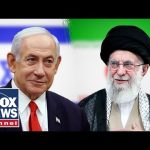In the latest news, President Trump confidently declared that a recent military strike on Iran has crippled its nuclear ambitions for years to come, disputing claims that it only delayed their program by months. This bold assertion has sparked discussions and debates among analysts and military experts alike. The President emphasized a thorough assessment of the operation, which utilized impressive firepower, including 14 bunker-buster bombs, to target Iran’s nuclear facilities. The data he presented painted a picture of total devastation at key sites, suggesting that Iran will find it nearly impossible to continue its nuclear enrichment efforts.
Many in NATO are reportedly thrilled with the outcome, viewing Trump’s actions as a decisive move in diminishing Iran’s status as a nuclear threat. With all the chaos in the region, NATO allies seem to breathe a sigh of relief knowing that American military might still stands strong. The operation, carried out at a height of 52,000 feet, targeted Natanz and Fordow facilities and has been described as transforming them into mere rubble. Imagery of smoke and flames was touted as evidence that the strike had a colossal impact, greatly weakening Iran’s capability to develop nuclear weapons.
However, amidst the optimism, there are lingering concerns about Iran’s potential retaliatory actions. While the President insists that Iran is no longer looking to enrich uranium or develop a bomb, experts like Dr. Rebecca Grant remind us of the regime’s stubbornness and ideological motivations. The reality is that although their nuclear aspirations may have taken a hit, Iran, being a nation anchored in its complex theocracy, is still a significant player in the Middle East landscape, with its missiles capable of reaching NATO territory.
The situation is further complicated by recent hostilities involving Hamas, which has openly aligned with Iran. Certain speculation points to the idea that the U.S. may leverage its newfound momentum with Iran to negotiate the release of hostages taken by Hamas. As President Trump engages in diplomacy, he seems hopeful about a deal being reached soon that could lead to a ceasefire and ultimately a better future for Gaza. However, it’s clear that negotiating with a group like Hamas, known for its unyielding and combative stance, is not going to be a walk in the park.
The President’s press conference also highlighted NATO’s progress in military spending, with the Secretary General emphasizing that an increase in defense budgets is now expected ahead of schedule. As tensions with countries like Russia escalate, bolstering NATO’s defenses has become increasingly critical. With military procurements and strategic allocations moving forward faster than initially planned, the sentiment among NATO members signals a reinvigorated approach to global security.
In summary, the outcomes of the military strike against Iran have provoked relief among some allies while raising fresh concerns about future aggressions and the complexities of Middle Eastern politics. Whether or not the nuclear threat from Iran has been effectively neutralized remains to be seen, but there is consensus that President Trump’s strategic maneuvers could reshape the political landscape in that volatile region. The world watches carefully as the situation continues to unfold, hoping for peace but preparing for the unexpected.




